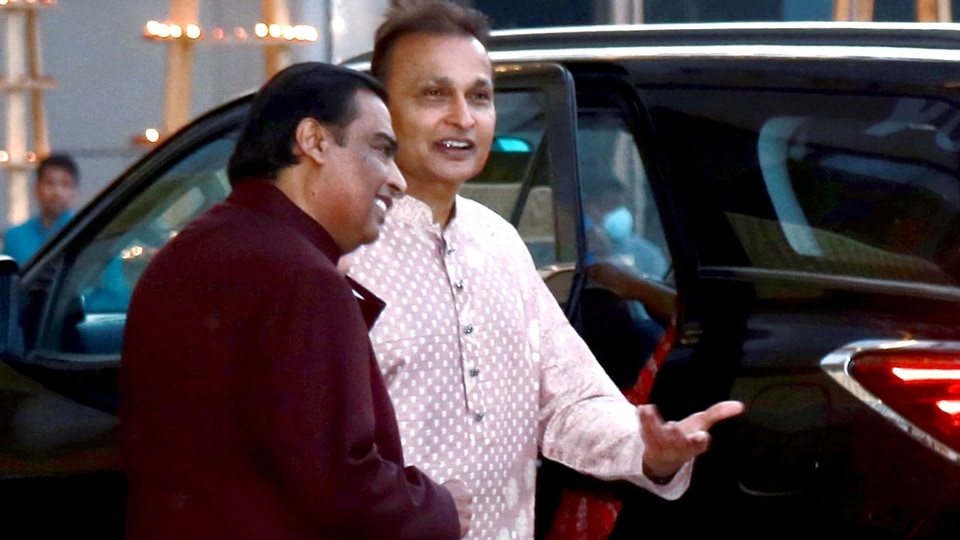How Mukesh Ambani Will Split His Reliance Empire to Avoid Dad, Dhirubhai Ambani's Folly; starts with Reliance Jio
Reliance Industries chief, Mukesh Ambani, the 10th-ranked billionaire in the world is slowly dividing up his empire among his family.

Around this time 13 years ago, billionaire Mukesh Ambani and his younger brother, Anil, were living in the same Mumbai house with their mother while they were busy fighting each other in Indian courts over their father's empire. Dhirubhai Ambani had died in 2002 without leaving a will — and, thus, the seeds of a fraternal feud.
As part of a 2005 family settlement, Mukesh had won control of deep-sea fields in the Bay of Bengal that had just started producing gas. But the agreement also required him to supply cheap feedstock at a fixed price for 17 years to Anil's proposed power plant. Honoring that pact might have ended the eight-hour-long electrical outages in the capital New Delhi, but it would have crippled Mukesh's Reliance Industries Ltd., India's largest non-state-owned company.
Luckily for the older sibling, the Indian Supreme Court's May 2010 verdict went in his favor: The gas was held to be Indian sovereign property, not Mukesh's to give. Two weeks later, the brothers agreed to live in “harmony,” and end most of the non-compete clauses of their separation — including in the telecoms sector, where Anil ran Reliance Communications Ltd. On that basis, Mukesh Ambani re-entered the industry a month later, a move that would catapult him to his current standing as the world's 10th richest tycoon with a net worth of $90 billion.
There've been a few more developments since. The gas discovery, the centerpiece of the feud, proved to be a damp squib. Several of Anil's companies have gone bankrupt. It was symbolic, therefore, that when Mukesh Ambani this week put in motion his own succession plan — the 65-year-old isn't repeating his father's folly — he started with the telco.
Ambani's first-born, Akash, 30, will succeed him as chairman at India's No.1 wireless carrier Reliance Jio Infocomm Ltd. The patriarch, who resigned from the Infocomm board, will continue to helm Jio Platforms Ltd., which owns all digital assets including the telco. This is probably a stopgap arrangement until Jio Platforms, whose investors include Meta Platforms Inc. and Alphabet Inc., concludes its much-awaited initial public offering. Since telecom carriage is entwined with commerce — Ambani's Reliance Retail runs India's largest network of stores while his JioMart is a federation of mom-and-pop shops looking to sell online — Akash's twin sister Isha Ambani is widely expected to head it.
In such a scenario, the 27-year-old Anant Ambani — the youngest of the three children — will likely preside over the legacy oil-to-chemicals business. But with a twist: He has to complete his dad's pivot away from polluting hydrocarbons and toward cleaner energy sources like solar panels, sodium-ion batteries and, most importantly, green hydrogen at under $1 per 1 kilogram within a decade, or what his dad calls the 1-1-1 target.
Mukesh Ambani only began talking about the “momentous leadership transition” at an employees' event in December last year. So it's hard to say what the eventual arrangement will look like, and how soon the changes will be implemented. But it wouldn't be a surprise if retail, telecom and energy end up as professionally managed, independently listed companies with equity participation — and operational support — from one or more strategic partners. In this scenario, the children, plus Ambani and his wife Nita Ambani, can exercise control through their shares in Reliance Industries, which will own stakes in Jio Platforms, Reliance Retail and the energy business, Reliance O2C.
Such a structure won't be without its problems. Separate stock-market listings for the units could saddle Reliance with a permanent holding-company discount: the tendency of the stock market to value a conglomerate at less than sum of its parts. But de-merging them — so that Reliance investors would directly own proportional stakes of operating entities — would erode the might of the consolidated balance sheet. Fitch Ratings assesses Reliance's foreign-currency creditworthiness at BBB, a notch higher than India's sovereign debt. Reliance enjoys a formidable cost of capital advantage because it has a high operating profit and very little debt. Keeping that edge may be of great value to the next generation, especially as the rivalry intensifies with India's other industrial titan, Gautam Adani — who has leapfrogged Ambani on the global wealth rankings to take the No. 7 spot.
If this is indeed the favored template, then the model is in place for Jio Platforms minus the IPO: Google's Sundar Pichai didn't just invest in Jio, he also helped it with a cheap, Android-based phone; Facebook's WhatsApp messaging service could help neighborhood JioMart stores take customer orders and payments on the phone. Ambani might have wanted to strike similar deals with Amazon.com Inc. in retail and with Saudi Aramco for his oil-refining complex, the world's largest. But instead of a partnership with Amazon, there's now keen competition. Reliance's courtship of Aramco went on for more than two years, only to collapse without a transaction. Worse, Bloomberg News has reported that arch-rival Adani is now flirting with Aramco. With so much going on, Ambani will want as little boardroom drama as possible.
When Mukesh and Anil Ambani were taking their dispute over gas to the Indian Supreme Court in the summer of 2009, the combined stock-market value of their empires was $108 billion — five times what they were worth before the family settlement. Now, Mukesh's Reliance Industries is worth $221 billion, while pretty much the only value left in Anil's group, outside of power generation, transmission and distribution, is whatever creditors can get from bankruptcy proceedings against several of his firms.
Could the brothers have achieved more together, for themselves and investors? Perhaps not. Much is made of their different personalities: Mukesh has always been reticent, publicity-shy and execution-focused; Anil, when I last saw him during the feud with his brother, was gregarious, flamboyant, and much loved by politicians and the media. Such differences between siblings, however, can be complementary. But when they aren't, it's best for each to go their separate way.
For now, Mukesh Ambani's children will want to keep their ties to the Reliance mothership; which means they will have to accept the conglomerate's capital-allocation policies even as they are free to do their own thing. That's likely the best their father can do for them — and the group — without weakening the whole. It's certainly a better transition than what he had to endure.
Andy Mukherjee is a Bloomberg Opinion columnist covering industrial companies and financial services in Asia. Previously, he worked for Reuters, the Straits Times and Bloomberg News.
Catch all the Latest Tech News, Mobile News, Laptop News, Gaming news, Wearables News , How To News, also keep up with us on Whatsapp channel,Twitter, Facebook, Google News, and Instagram. For our latest videos, subscribe to our YouTube channel.


























